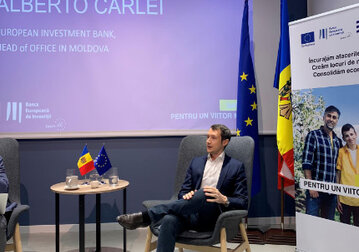
The EIB is ready to provide Moldovan gardeners with about 60 million euros for the development of their business under the Livada Moldovei program.
This was stated by the new head of the European Investment Bank's office in Moldova, Alberto Carley, at a meeting with journalists. He noted that since the opening of the Livada Moldovei credit line in the amount of 120 million euros, more than 280 investment projects received funds from the EU financing offered through the European Investment Bank. There is currently an unused fund of about € 60 million that will be available to other beneficiaries. Since the beginning of 2021, 82 recipients of the Livada Moldovei credit line have received loans totaling 12.6 million euros. Livada Moldovei is a key operation of the European Investment Bank, which aims to support the private sector in Moldova. This credit line has helped revitalize the horticultural sector and support many small and medium-sized enterprises to better operate in the highly competitive and capacious Moldovan market, as well as help them diversify their export destinations, ”said Alberto Carley, head of the EIB Moldova office. As InfoMarket previously reported, the Livada Moldovei Program is funded by the European Union through the European Investment Bank and provides for a loan of 120 million euros to support the modernization and restructuring of the value chain in the horticultural sector of Moldova, to help Moldovan farmers develop rural business and increase their competitiveness so that domestic producers can increase their exports to the EU. The credit line offers loans from 5 thousand to 5 million euros, tax incentives, as well as advice on the development of an investment project. The EIB funds are allocated to increase the competitiveness of domestic horticulture and viticulture in the domestic and foreign markets by ensuring the modernization of all production processes, crop processing, post-harvest period through the introduction of modern technologies for the growth and storage of horticultural and viticultural products. The money can be used to technologize and mechanize production in horticulture by promoting intensive and super-intensive fruit production, to equip gardens with irrigation and anti-hail installations, to modernize and technologize the processes of post-harvesting and processing of fruits, to develop post-harvest infrastructure for products intended for fresh consumption, to diversify the sales markets for Moldovan fruits, to support long-term and medium-term investments for the sector of production and processing of vegetables, grapes, the development of nurseries, the production of bottled wines, the development of wine-making and agricultural tourism, etc. The total cost of each subproject cannot exceed 5 million euros. Last year, through the Livada Moldovei credit line, 100 gardeners from all over the country financed projects worth 17.1 million euros. Since the beginning of this year, they have received loans under the Livada Moldovei project totaling 12.6 million euros. At the same time, most of the loans allocated this year - 40.4% - were provided to apple producers. Table grape producers received 22.6% of the total volume of loans issued this year, plum producers - 11.9% of the total volume of loans. Most of the funds were invested in the production, processing and storage of apples. Investments were made in all corners of the country, and the Briceni district is the record holder with 9 investment projects, 8 of which are focused on apple orchards. This is followed by the Straseni district with 7 investment projects in the field of beekeeping, apple and plum orchards, as well as the production of table grapes. Since the beginning of 2021, in the Ialoveni region, 6 loans have been received under the Livada Moldovei program, and in Anenii Noi, Causeni, Edinet and Ocnita regions - 5 loans each. Since hail poses a serious danger to horticulture, 20 investment projects included the purchase and installation of anti-hail systems. In order to avoid losses and extend the shelf life of vegetables and fruits, 16 beneficiaries received loans for the installation of cold storage rooms. Thanks to EU funding through the European Investment Bank, 11 gardeners purchased irrigation systems, 7 invested in electric forklifts, another 7 in planting gardens and 4 in solar panels, which will allow producers to reduce energy costs. The funds have also been invested in fruit and vegetable drying plants, raw material sorting and processing lines, and sewage treatment plants.// 29.09.2021 — InfoMarket






